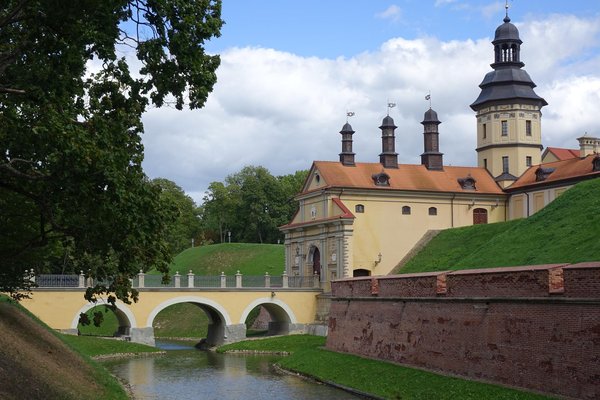Belarus
Nesvizh
The Architectural, Residential and Cultural Complex of the Radziwill Family at Nesvizh consists of a residential castle and the Corpus Christi Church, which had their influence on architecture all over Central and Eastern Europe.
The Radziwill dynasty acted as politicians and patrons of art from the 16th to 19th centuries. They incorporated influences from Southern and Western Europe, leading to the Renaissance and Baroque design of this complex. An Italian architect was responsible for creating the domed church.
Community Perspective: the interior of the Corpus Christi church has good frescoes and an interesting family crypt, while the palace comes with the usual series of European-style palace rooms.
Site Info
Official Information
- Full Name
- Architectural, Residential and Cultural Complex of the Radziwill Family at Nesvizh (ID: 1196)
- Country
- Belarus
- Status
-
Inscribed 2005
Site history
History of Nesvizh
- 2005: Inscribed
- Inscribed
- Type
- Cultural
- Criteria
- ii
- iv
- vi
Links
- UNESCO
- whc.unesco.org
- Official
-
- niasvizh.by — Niasvizh
All Links
UNESCO.org
- whc.unesco.org — whc.unesco.org/
Official Website
- niasvizh.by — Niasvizh
Community Information
- Community Category
- Secular structure: Residence
Travel Information
Red Zone Travel Advisory
Recent Connections
-
Perfect Inscriptions
2005 -
Red Zone Travel Advisory
Belarus fully off-limits -
Moats
The buildings are set within the remain…
Connections of Nesvizh
- Individual People
- Trivia
-
-
On Banknotes
Nesvizh; 100000; 2000
-
- Architecture
-
-
English garden
-
Italian Architects outside Italy
Giovanni Maria Bernardoni -
Octagons
Wiki: "The chateau's corners were fortified with four octagonal towers."See en.wikipedia.org
-
Baroque
Corpus Christi Church
-
- World Heritage Process
-
-
Perfect Inscriptions
2005
-
- Religion and Belief
-
-
Jesuit Order
The Corpus Christi Church (constructed 1587-1593) is one of the earliest Jesuit churches in the world (wiki)
-
- Constructions
-
-
Hospitals
Used as a sanitorium during the Soviet era -
Moats
The buildings are set within the remains of 16th century fortifications comprised of four bastions and four curtain walls in a rectangular plan, surrounded by a moat. (OUV) -
Dynastic Burial Places
"The physical presence of the Radziwills? remains in situ with the 72 coffins and sarcophagi of the Corpus Christy Church-Mausoleum." (AB)
-
- WHS on Other Lists
-
-
Europa Nostra Award
Category Dedicated Service (non-EU member)See niasvizh.by
-
Memory of the World
Radzwills' Archives and Niasvizh (Nieswiez) Library Collection (in Library of Nesvizh)
-
- Timeline
-
-
Built in the 16th century
"In 1582 Mikołaj Krzysztof "Sierotka" Radziwiłł ... started the construction of an imposing square three-storey "château". Although the works were based on a pre-existing structure of a medieval castle, the former fortifications were entirely turned into a renaissance-baroque house. Construction was completed by 1604,.... The most important structure .....is the Corpus Christi Church (1587 to 1603), " (Wiki)
-
- Science and Technology
-
-
Libraries
"The books of the library originated from practically all European printing houses of the period from the 15th to the first half of the 20th centuries. A map of the Grand Duchy of Lithuania, the so-called Radziwill map, was of particular significance to Central European cartography. It was the first map in the history of cartography to give a true picture of the entire territory of Belarus and Lithuania" (AB evaluation)
-
- Visiting conditions
-
-
Shoe covers required
-
Red Zone Travel Advisory
Belarus fully off-limits
-
News
No news.
Recent Visitors
Visitors of Nesvizh
- Adrian Turtschi
- Alexander Barabanov
- Alexander Lehmann
- Ali Zingstra
- A. Mehmet Haksever
- Ammon Watkins
- Anna Wludarska
- Atila Ege
- Bill Maurmann
- Brett Baumann
- ChrisDorn
- Christer Sundberg
- Christoph
- CugelVance
- Daniel Gabi
- Dimitar Krastev
- Dorejd
- Els Slots
- Erik Jelinek
- Eva Kisgyorgy
- Evgenii
- Fan Yibo
- Filip Murlak
- FK
- Gabor
- Gary Arndt
- Gernot
- Harald T.
- Harry Mitsidis
- henrik_hannfors
- Iain Jackson
- Ian Cade
- Ivan Rucek
- Jakubmarin
- Janos
- Jarek Pokrzywnicki
- Jonas Kremer
- jonathanfr
- Jon Opol
- Juha Sjoeblom
- jxrocky
- KarenBMoore
- Ken DJ
- Linz
- Loic Pedras
- Luis Filipe Gaspar
- Maciej Gil
- Mahuhe
- Malgorzata Kopczynska
- Małgosia Łupicka
- Mariam
- Martin
- Martina Rúčková
- Michael Novins
- Michael Turtle
- Mikko
- Milan Jirasek
- MMM
- nan
- Nick M
- nicku
- Nihal Ege
- palka25
- Petteri
- Philipp Leu
- Potsdamer
- Randi Thomsen
- Reiseblitz
- Roel Sterken
- Roger Enarsson
- Roger Ourset
- Roman Bruehwiler
- Sergio Arjona
- Slavi
- Stanimir
- Stanislaw Warwas
- Svein Elias
- Szucs Tamas
- Tamara Ratz
- Tarquinio_Superbo
- Tatiana Nikulnikova
- Tevity
- Thomas Buechler
- Tikhon Puliaev
- Timothy C Easton
- tony0001
- Tony H.
- triath
- Tsunami
- Vernon Prieto
- WalGra
- Walter
- Wojciech Fedoruk
- Yevhen Ivanovych
- Zoë Sheng
Community Reviews
Show full reviews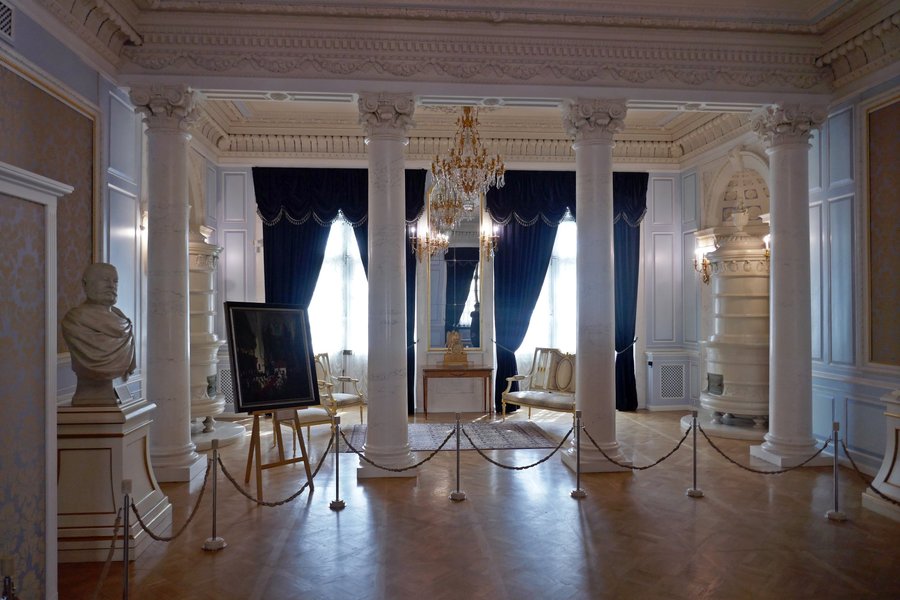
May 2025 visit. It seems like everyone visits Nesvizh after Mir Castle on the same day since they are only half an hour apart. This is probably the better choice as Nesvizh is the nicer of the two by a slight margin. Upon entry I was given an audioguide and shoe covers and had about 1 and a half hours to make my way through all the rooms. It is bigger and much more of a residential palace than Mir Castle but still undersells the power and influence of the Radziwill family in the history of this region.
Because it was a national holiday it was also busy with local visitors and got very crowded at times. Perhaps that's why I enjoyed my stroll around the moat and grounds more. I don't know if this is the more popular of the two but it is more set up to cater to tourists with little souvenir stands outside the walls and more restaurants in town. The nearby Corpus Christi church helps to elevate the site and its importance and should not be missed.
Keep reading 0 comments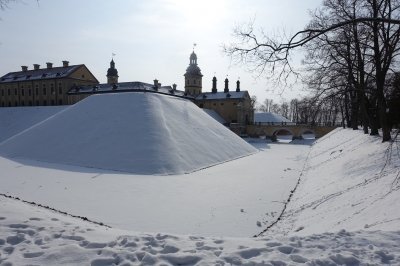
Normally, I am not too keen on museums embedded into historic places. The museums tend to be mediocre at best. Now I understand the need for operators to use all the available space - and with palaces space is often available in abundance - and to offer some form of experience apart from empty halls. But still there are only so many sign boards you can put up detailing the local history. But when it's -15°C outside, I noticed that I am way more open to spending time in a museum.
I had crossed the tree lined pathway across the lake to Nesvizh. It's quite impressive as you get close. The fortifications and the castle fit nicely into the surrounding scenery, especially with everything snow covered.
The site itself is similar to Zamosc across the border in Poland. The key difference is that Nesvizh is a fortified palace while Zamosc is a fortified town. The gardens and the landscape around Nesvizh are nicer, though. Hard to beat snow covered frozen lakes.
Getting There
I took a driver in Minsk for a day combining the visit of Nesvizh with a trip to Mir Castle. Both sites are fairly close to each other. I paid 100 EUR for the day trip. Having visited in the height of winter at -15°C I tried to minimize the time spent outside. Consequentially, waiting outside at random bus stops was not an option. Read my Mir review for comments on how …
Keep reading 0 comments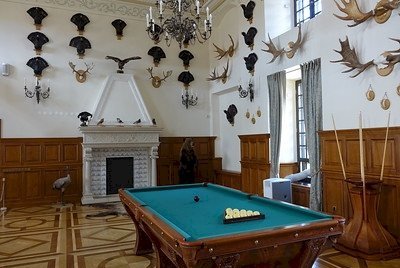
Nesvizh until 1939 was the family estate of the most prominent noble family from Belarus: the Radziwill. The WHS consists of a palace with landscaped gardens and a church. I visited it right after Mir Castle: it lies just about half an hour away, a bit deeper into the countryside. With only 33 recorded visits on this website, it ranks a very low 442nd among 500 European/North American WHS. On the day itself, it was also much less crowded than Mir.
I started with a quick lunch in Nesvizh town because I wanted to try out the Belarussian specialty ‘machanka’ (something creative with the regional staples of pork and potato – not recommended). On to the palace then, which lies at the end of a very long driveway on the outskirts of town. It has been reconstructed since 2001, and was hit by a fire in 2002 but the works seem to be all finished now. You can compare my pictures with those in the other Nesvizh reviews on this website for a ‘before and after’.
They obviously are very careful with the interior of the palace, as everybody is requested to wear plastic shoe covers. What awaits inside is a series of European-style palace rooms. The founding Radziwill got inspired by French and German castles during his travels and wanted to recreate such a thing for his family in Belarus. Like in Mir, there is not much original in here but the audio guide diligently explained per …
Keep reading 0 comments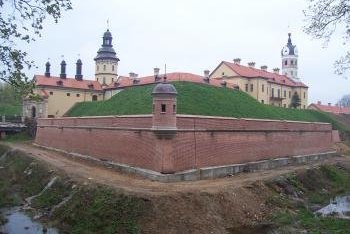
This was the second WHS we visited on our day trip from Minsk. It was certainly more impressive than Mir, the castle was complemented by a large park and lake and also several sites in the town proper.
In 2010 there was still a fair bit of (re)construction going on, but it has evidently progress since Christer’s photo was taken. One wing of the castle was open and contained a small exhibition on the castle as well as items from the Radziwill’s extensive library and some unremarkable reconstructed rooms. There was a little more to see than at Mir, but still you would not be missing out on much if you were to forego the castle interior.
By far the most impressive thing we saw was the interior of the Corpus Christi church which is located in the town just before heading out on the causeway to the castle. The Fresco’s inside were incredible and a real surprise. It was like being suddenly transported to Italy, if you have made it this far then this is something that really should not be missed. There was also a crypt containg the remains of many members of the Radziwill family. The influence of the Radziwill family can be found across many parts of Central and Eastern Europe, and the layout of the town and castle have also had their effect.
This site was by far the better of the two WHS we visited on this day trip from Minsk and hopefully will …
Keep reading 0 comments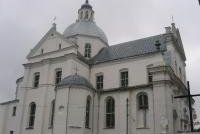
When I visited the castle,it was under restoration.This architecture has been a sanatrium until recent year.Almost all furniture were out of the castle under the period of being a sanatrium,but castle itself is an impressive Baroque style one and the yellow wall contrasts with blue lake.
The church is a rare example of cross-cupola one in this region and has beautiful interior decorations.Central top of the cupola was damaged by the bomb during the period of WW2,but all has restored.
This city is a good excursion point from Minsk.
Keep reading 0 comments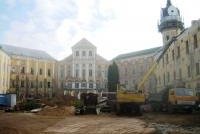
Both the castle Mir and Nesvish was once founded by the influential Radzivill family and the Nesvish Castle is the more modern of the two. Beautifully located next to a series of ponds, it is well worth a visit but, but, but…..appointing the Nesvish Castle a World Heritage Site must have sparked some rapid investment from the Belorussian government to turn what has been used as a sanatorium for the last 50 years into a historical monument of class. Therefore the entire castle has been turned into a building site and will probably not be accessible for the next ten years or so.
Until then you can admire the beautiful park with several small monuments and statues, commemorating different coactions in the life’s of the Radzivill family or stroll by the ponds on a warm summer day or visit the nearby churches and monasteries in the town of Nesvish.
Keep reading 0 comments
